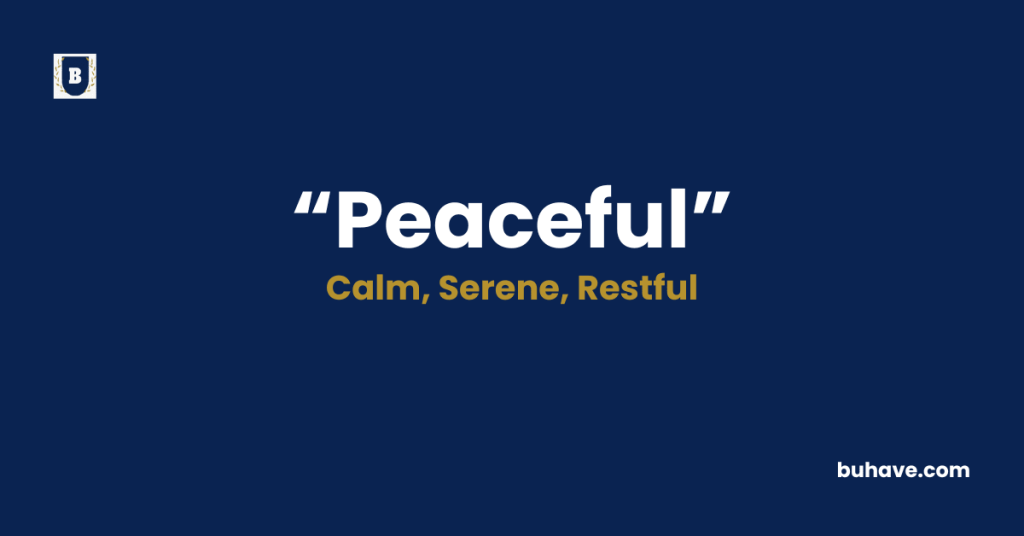The word ‘Peaceful’ (Adjective) describes a state of calmness, serenity, or freedom from disturbance, whether in a place, situation, or person. In this guide, you’ll learn the full definition, synonyms, antonyms, etymology, and real-life examples of how to use ‘Peaceful’ correctly in sentences.
Peaceful Explained in Depth
A complete and detailed guide to the word Peaceful including meaning, definition, examples, etymology, synonyms, and antonyms.
Meanings of Peaceful
The word peaceful refers to a condition or quality that is calm, tranquil, and free from conflict, noise, or disturbance. When something is described as peaceful, it typically evokes a sense of safety, quiet, or stillness. For example, a peaceful morning may include birds chirping, soft sunlight, and an overall sense of comfort and contentment. Likewise, a peaceful person is someone who promotes harmony, avoids conflict, and exudes a gentle or serene demeanor.
People often use the term “peaceful” to describe not only physical environments but also emotional and mental states. A peaceful mind is one that is not overwhelmed with stress or anxiety; it is steady, content, and relaxed. In relationships and society, peace often refers to the absence of violence or tension, and the presence of understanding and cooperation. The term is also widely used in global discourse to promote diplomacy and nonviolence.
Whether it’s about a sleeping baby, a quiet forest, or an untroubled heart, “peaceful” suggests a condition where everything is in balance, and disturbances are either minimal or entirely absent.
Definition
“Peaceful” is defined as having or showing a state of calmness, freedom from disturbance, violence, or worry. It describes situations, environments, or people that promote serenity, restfulness, or quietude. Peacefulness often involves a sense of balance, inner calm, and absence of conflict. This adjective can refer to anything from nature scenes and emotional states to social and political conditions.
For instance, a peaceful protest is one conducted without aggression or violence, focusing on dialogue and change through non-confrontational means. Similarly, a peaceful home environment supports emotional well-being by minimizing conflict and fostering understanding. On a personal level, someone might seek a peaceful life one marked by simplicity, balance, and freedom from constant chaos. This word carries a strong positive connotation and is frequently associated with healing, meditation, and holistic well-being.
Ultimately, “peaceful” encompasses much more than the absence of war or noise—it speaks to a fundamental human desire for harmony, safety, and internal tranquility.
Etymology
The etymology of the word “peaceful” traces its roots to the word “peace,” which comes from the Latin word pax, meaning “peace, compact, agreement, tranquility.” This Latin root passed into Old French as pais and later into Middle English as pece. The suffix “-ful,” added to “peace,” forms the adjective “peaceful,” which literally means “full of peace.”
The term began appearing in English during the late Middle Ages, around the 14th century, when it was used to describe a person or situation that was not warlike or aggressive. Over time, the meaning expanded from simply referring to the absence of war to include inner calm, emotional serenity, and spiritual tranquility. In religious and philosophical contexts, especially within Buddhism and Christian mysticism, peacefulness became synonymous with enlightenment and harmony with the universe. By the modern era, “peaceful” had evolved to describe not only social conditions but also individual states of mind and natural environments.
Today, the word remains closely tied to both personal and collective experiences of tranquility. Whether describing a quiet sunset, a loving relationship, or a nonviolent movement, “peaceful” continues to carry the ancient longing for a life of balance and undisturbed beauty.
Example Sentences
- The lake was so peaceful that even the slightest breeze felt like a whisper.
- She found the meditation retreat to be incredibly peaceful and rejuvenating.
- Despite the chaos outside, he remained peaceful and calm inside.
- They organized a peaceful protest to raise awareness without causing harm.
- Living in the countryside gave him a peaceful lifestyle away from the city’s hustle.
Peaceful Synonyms
- Tranquil
- Calm
- Serene
- Restful
- Quiet
- Harmonious
- Gentle
- Placid
- Relaxing
- Undisturbed
Peaceful Antonyms
- Chaotic
- Noisy
- Violent
- Disturbed
- Restless
- Agitated
- Unsettled
- Stormy
- Warlike
- Conflicted
FAQs about Peaceful
Here are some frequently asked questions (FAQs) about the word “Peaceful”
1. What does “peaceful” mean in daily life?
It refers to calm, quiet, and non-violent situations or emotions, such as a quiet evening at home or a relaxing walk in nature.
2. Can “peaceful” describe a person?
Yes, a peaceful person is someone who promotes harmony, avoids arguments, and maintains inner calm.
3. What is the difference between “peaceful” and “quiet”?
“Quiet” refers to a lack of noise, while “peaceful” includes emotional and mental calmness, as well as the absence of conflict.
4. Is “peaceful” always a positive word?
Generally, yes. It implies comfort, calmness, and the absence of stress or violence, which are typically viewed as positive qualities.
5. Can a protest be peaceful?
Absolutely. A peaceful protest is one where participants express their views without resorting to violence or aggression.
6. How do you create a peaceful environment?
By minimizing noise, avoiding conflict, promoting understanding, and designing spaces that encourage relaxation and calm.
7. Can “peaceful” apply to animals?
Yes, animals can be described as peaceful when they are calm and non-aggressive in their behavior.
Explore more P words
Positive words that start with P
Negative words that start with P
Names that start with P
Nouns that start with P
Verbs that start with P

















